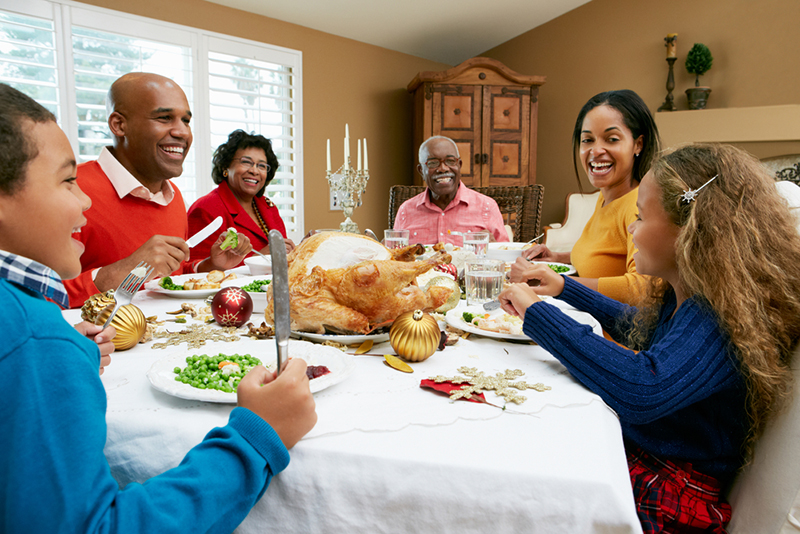
A healthy diet is not only critical to proper diabetes management, but will also help you stay at a desirable weight, control your blood pressure, and prevent heart disease and stroke. The arrival of the holiday season does not have to disrupt your diabetes management. With a little preparation, you can avoid the holiday feast anxiety and enjoy your time at the table.
- Focus on friends and family instead of food. Remember, the holidays are a time to slow down and catch up with your loved ones. Play games, volunteer, or spend time outdoors enjoying the weather together.
 It’s a party, but don’t overdo it. Eat slowly, and really enjoy the foods that you may only have once a year. If the meal will be served near your usual meal time, try to eat the same amount of carbohydrate that you normally would for a meal. If you plan to have a portion of dessert, cut back on another carbohydrate food during the main course. Make sure your portions are reasonable and resist going back for second helpings.
It’s a party, but don’t overdo it. Eat slowly, and really enjoy the foods that you may only have once a year. If the meal will be served near your usual meal time, try to eat the same amount of carbohydrate that you normally would for a meal. If you plan to have a portion of dessert, cut back on another carbohydrate food during the main course. Make sure your portions are reasonable and resist going back for second helpings.- Eat before you eat. Don’t skip meals or snacks earlier in the day to “save” calories and carbs for the large holiday feast later on. If you skip meals, it will be harder to keep your blood glucose in control. Also, if you arrive somewhere hungry, you will be more likely to overeat.
- Bring what you like. Don’t spend time worrying about what will be served. Offer to bring your favorite diabetes-friendly dish. If you count carbs, check your recipe’s nutrition facts so you know how big a serving is and how many carbs it has.
- Drink in moderation. If you drink alcohol, remember to eat something beforehand to prevent low blood glucose levels later. Whether it’s a glass of red wine or a beer, holiday drinks can add a significant amount of calories to your holiday intake. Keep it to no more than 1 drink for women and 2 drinks for men.
- Stay active. One reason that we have problems managing diabetes and weight during the holidays is our lack of physical activity. Sure, the holidays are busy, but plan time into each day for exercise and don’t break your routine. Make the holidays an active time!
- If you overindulge, get back on track. If you eat more carbs or food than you planned for, don’t think you have failed. Stop eating for the night and focus on spending the rest of your time with the people around you. Include extra exercise, monitor your blood glucose levels, and get back on track with your usual eating habits the next day.
If you are cooking over the holidays here are some healthy tips to lower caloric intake, fats, and sugars:
- Use nonstick cooking spray instead of oil, shortening, or butter.
- If you do use oil, use canola, olive, or sunflower oil instead of vegetable oil.
- Season foods, such as meats and steamed vegetables with herbs and spices (such as pepper, cinnamon and oregano), vinegar, lemon juice, or salsa instead of salt, butter or sugary sauces.
- Use low- or no-sugar jams instead of regular jams.
- Eat whole-grain, high-fiber cereals or oatmeal with skim or 1 percent milk.
- Use low-fat or fat-free dairy products like milk, yogurt, cottage cheese, and sour cream in place of full fat versions.
- Avoid drinks with calories. Don’t drink juice, soda or other sweet beverages and limit your intake of ‘diet’ versions.
- Trim excess fat off meats and eat chicken or turkey without the skin.
- Always buy lean cuts of meat and choose a healthy cooking method such as broiling, roasting, stir-frying, or grilling.
- Buy whole-grain breads and cereals instead of processed, refined grains like white flour.
For more information about managing diabetes over the holidays contact VMC’s Diabetes Education and Nutrition Clinic.

